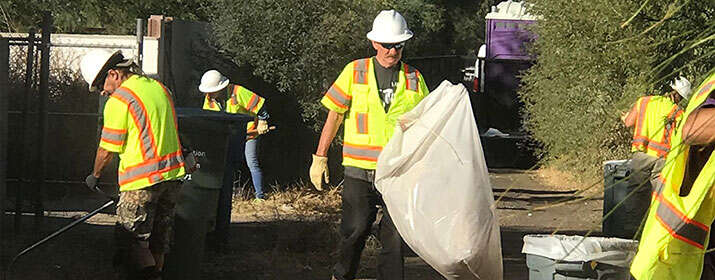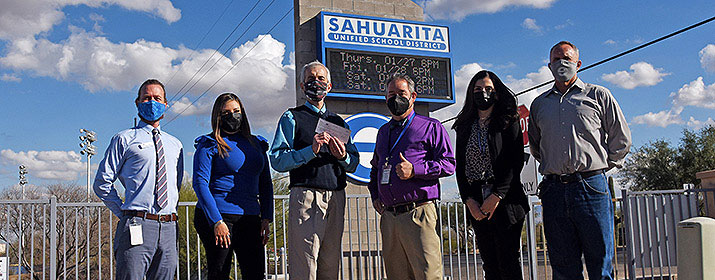
Homeless people are cleaning up neighborhoods and getting help finding shelter and permanent homes, thanks to Old Pueblo Community Services.
TEP provided support to launch the group’s Homeless Work Program seven years ago and has since supported the nonprofit’s work in assisting about 2,000 people each year with housing, counseling and support services.
Old Pueblo Community Services (OPCS) plans to open a new facility soon that will help it significantly expand its reach and offerings, from temporary shelter to household items for permanent homes.
In fall 2022, the group broke ground on new headquarters, the Center of Housing First, with a goal of ending homelessness in our community. The first phase of the facility is expected to open in July. TEP’s most recent $15,000 donation helped with those initial costs.
The facility will support a 40-percent increase in services, said Tom Litwicki, Chief Executive Officer of OPCS.
“The Center for Housing First is focused on getting people the initial shelter they need, as well as additional services to assist them toward long-term housing stability,” said Wendy Erica Werden, Manager of Community Investment and Philanthropy. “With the alarming growth in the homeless population in the last several years, our community needs these services more than ever.”
TEP’s partnership with OPCS is part of our company’s philanthropic focus on community assistance. More recently, TEP has concentrated on addressing housing stability, an issue that has become more pressing in recent years.
The Homeless Work Program started with jobs for six or seven people each day, two days a week. Soon, the program plans to connect 35 people with jobs five days a week. Workers will be recruited from local shelters for the temporary day jobs, said Bear Barley, Employment Services Manager.
Since the program was launched, it has served more 1,300 people and collected more than 230 tons of trash from about 400 cleanup sites. More than 30 percent of participants have since entered housing.
See a video about the success of the Homeless Work Program.
Some program funding comes from coins dropped in collectors that look like parking meters that have been set up downtown through the Tucson Change Movement initiative. TEP previously served as a sponsor of these donation meters as a way to encourage community contributions to this cause.
More recently, TEP has contributed to the OPCS Home Fund, which covers costs associated with transitioning out of homelessness, such as utility connection fees, beds, household items and deposits. OPCS provides kits with items, such as pots and pans, cleaning supplies and linens, that clients need to settle into a new home.
“It can make a difference between getting into an apartment or not,” Litwicki said.
The nonprofit has seen homelessness and housing insecurity grow dramatically in recent years because of the pandemic, inflation and increased housing and rental costs.
Homelessness has increased by about 47 percent since 2020 in Tucson, according to an estimate by the Tucson Pima Collaboration to End Homelessness and the University of Arizona. Also, OCPS has seen its clientele grow about 10 to 20 percent each year for the past eight years, Litwicki said.
“TEP has really been supporting those crucial, extra services that we need for people, and it’s becoming more critical,” Litwicki said. “We appreciate what TEP has done to help us continue to serve our community.”






